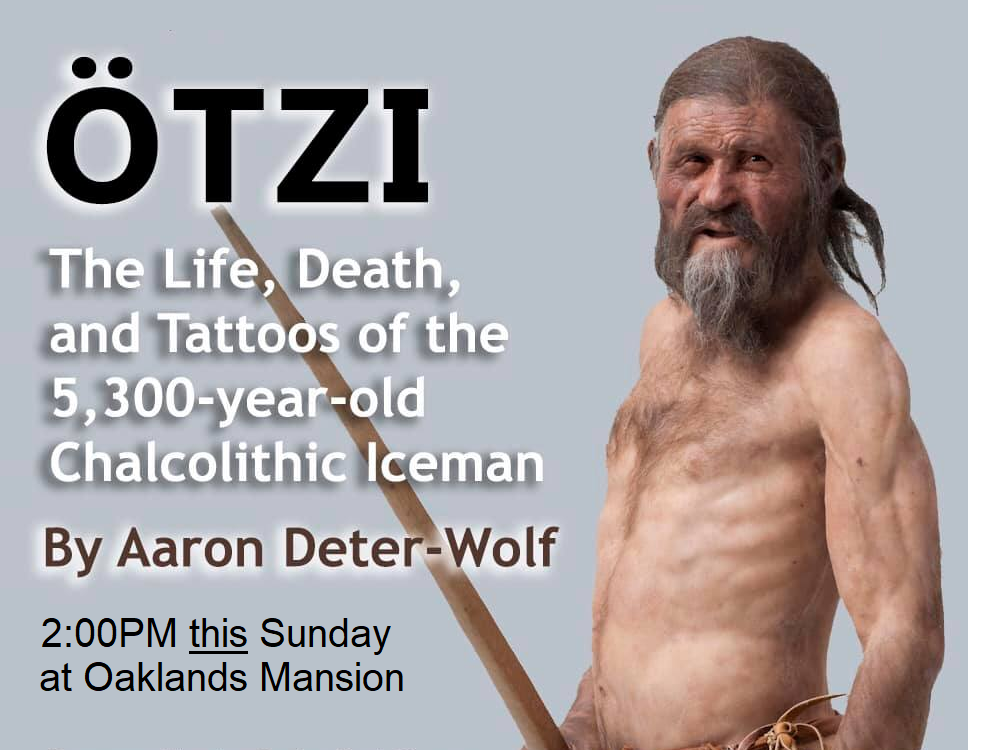(MURFREESBORO) Learn about “Ötzi: The Life, Death, and Tattoos of the 5,300-year-old Chalcolithic Iceman” in a free public talk at 2:00 o'clock this Sunday afternoon (8/27/2023). Prehistoric Archaeologist Aaron Deter-Wolf is the guest of the Rutherford County Archaeological Society. The presentation will be in Maney Hall at Oaklands Mansion (900 N. Maney Ave.).
As you recall, Prehistoric Archaeologist Deter-Wolf was heavily involved in the 2014 studies at Murfreesboro’s Black Cat Cave (see below).
Thanks to extraordinary preservation, researchers have documented 61 carbon pigment marks on Ötzi’s skin. Those tattoos are the oldest preserved examples from anywhere on Earth, and to date are the only direct archaeological evidence of tattooing in European antiquity.
This Sunday’s speaker at Oaklands is a leading researcher in the archaeological study of tattooing. His studies include efforts identifying tattooing tools in archaeological collections, the non-destructive documentation of preserved tattoos on archaeological human remains, and studies recreating and testing ancient and historical tattooing implements.
Following three decades of research, archaeological science has revealed more about this Chalcolithic man than perhaps any other individual ancient human. Numerous studies have examined aspects of the Iceman’s life including his tools, clothes, health conditions, the environment in which he lived, the ingredients of his last meal, and the circumstances of his death.
In 2016 Deter-Wolf was lead author of the study confirming Ötzi’s tattoos as being the oldest examples of that practice, and he recently completed a research project using experimental archaeology to evaluate how the Iceman’s tattoos were created.
In this program for the Rutherford County Archaeological Society, Deter-Wolf will discuss the current understanding of Ötzi’s life and final days, and what 5,300- year-old tattoos may tell us about ancient and modern human behavior.
By the way, Deter-Wolf is with the Tennessee Division of Archaeology and is a leading researcher in the archaeological study of tattooing.
More On Black Cat Cave
A 2014 WGNS news story said, “Deter-Wolf and members of the Native History Association are in a collaborative effort to preserve, protect, and study the unique prehistoric and historic occupations of Black Cat Cave.”
Obviously, the once controversial Black Cat Cave, across from the VA Hospital, was more than a speakeasy in the Prohibition days of the 1920's. Recent findings indicate the cavern could have prehistoric Native American ties
The local founder of the Rutherford County Archaeological Society was Laura Bartel, and she was one of those on the university's team who explored, studied and did carbon-dating of finds in the local cavern.
Artifacts recovered from the site indicate Black Cat Cave was occupied beginning in the early portion of the Archaic period, and extending well into the Middle Archaic.
Murfreesboro's Black Cat Cave remains barred, locked and protected from vandalism as studies continue.
Don't Miss This Sunday's Free Talk
Again, the public is encouraged to attend this free presentation at 2:00 o’clock this coming Sunday afternoon in Maney Hall at Oaklands Mansion (900 N. Maney Avenue).





